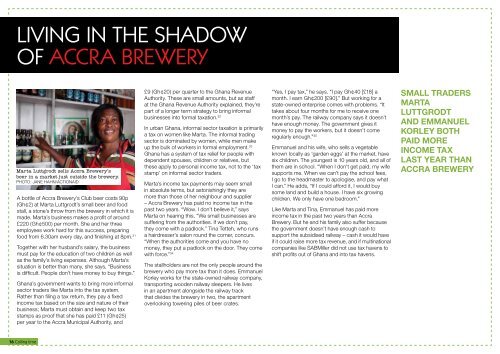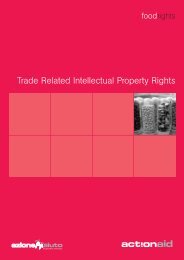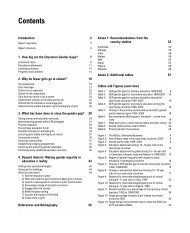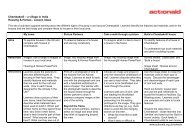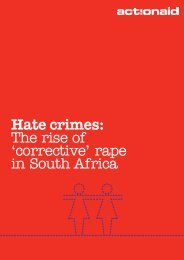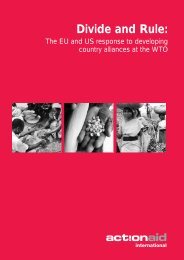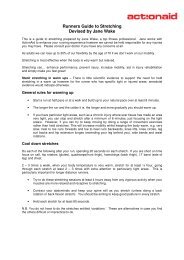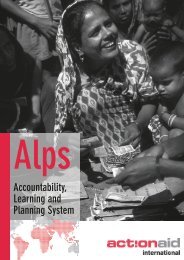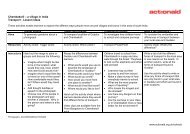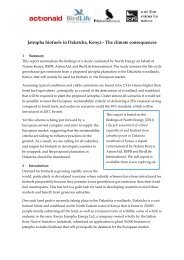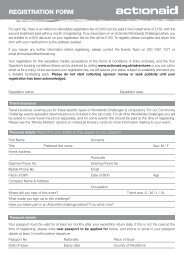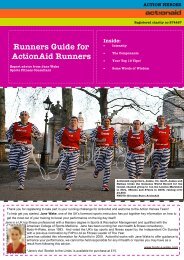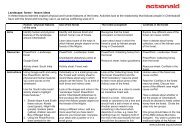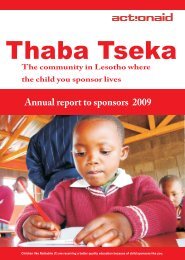You also want an ePaper? Increase the reach of your titles
YUMPU automatically turns print PDFs into web optimized ePapers that Google loves.
xxx livinG in the ShAdow<br />
of ACCrA Brewery<br />
Marta Luttgrodt sells Accra Brewery’s<br />
beer in a market just outside the brewery.<br />
PHOTO: JANE HAHN/ACTIONAID<br />
A bottle of Accra Brewery’s Club beer costs 90p<br />
(Gh¢2) at Marta Luttgrodt’s small beer and food<br />
stall, a stone’s throw from the brewery in which it is<br />
made. Marta’s business makes a profit of around<br />
£220 (Gh¢500) per month. She and her three<br />
employees work hard for this success, preparing<br />
food from 6.30am every day, and finishing at 8pm. 31<br />
Together with her husband’s salary, the business<br />
must pay for the education of two children as well<br />
as the family’s living expenses. Although Marta’s<br />
situation is better than many, she says, “Business<br />
is difficult. People don’t have money to buy things.”<br />
Ghana’s government wants to bring more informal<br />
sector traders like Marta into the tax system.<br />
Rather than filing a tax return, they pay a fixed<br />
income tax based on the size and nature of their<br />
business; Marta must obtain and keep two tax<br />
stamps as proof that she has paid £11 (Gh¢25)<br />
per year to the Accra Municipal Authority, and<br />
16 <strong>Calling</strong> time<br />
£9 (Gh¢20) per quarter to the Ghana Revenue<br />
Authority. These are small amounts, but as staff<br />
at the Ghana Revenue Authority explained, they’re<br />
part of a longer term strategy to bring informal<br />
businesses into formal taxation. 32<br />
In urban Ghana, informal sector taxation is primarily<br />
a tax on women like Marta. The informal trading<br />
sector is dominated by women, while men make<br />
up the bulk of workers in formal employment. 33<br />
Ghana has a system of tax relief for people with<br />
dependent spouses, children or relatives, but<br />
these apply to personal income tax, not to the ‘tax<br />
stamp’ on informal sector traders.<br />
Marta’s income tax payments may seem small<br />
in absolute terms, but astonishingly they are<br />
more than those of her neighbour and supplier<br />
– Accra Brewery has paid no income tax in the<br />
past two years. “Wow. I don’t believe it,” says<br />
Marta on hearing this. “We small businesses are<br />
suffering from the authorities. If we don’t pay,<br />
they come with a padlock.” Tina Tetteh, who runs<br />
a hairdresser’s salon round the corner, concurs.<br />
“When the authorities come and you have no<br />
money, they put a padlock on the door. They come<br />
with force.” 34<br />
The stallholders are not the only people around the<br />
brewery who pay more tax than it does. Emmanuel<br />
korley works for the state-owned railway company,<br />
transporting wooden railway sleepers. He lives<br />
in an apartment alongside the railway track<br />
that divides the brewery in two, the apartment<br />
overlooking towering piles of beer crates.<br />
“Yes, I pay tax,” he says. “I pay Gh¢40 [£18] a<br />
month. I earn Gh¢200 [£90].” But working for a<br />
state-owned enterprise comes with problems. “It<br />
takes about four months for me to receive one<br />
month’s pay. The railway company says it doesn’t<br />
have enough money. The government gives it<br />
money to pay the workers, but it doesn’t come<br />
regularly enough.” 35<br />
Emmanuel and his wife, who sells a vegetable<br />
known locally as ‘garden eggs’ at the market, have<br />
six children. The youngest is 10 years old, and all of<br />
them are in school. “When I don’t get paid, my wife<br />
supports me. When we can’t pay the school fees,<br />
I go to the headmaster to apologise, and pay what<br />
I can.” He adds, “If I could afford it, I would buy<br />
some land and build a house. I have six growing<br />
children. We only have one bedroom.”<br />
Like Marta and Tina, Emmanuel has paid more<br />
income tax in the past two years than Accra<br />
Brewery. But he and his family also suffer because<br />
the government doesn’t have enough cash to<br />
support the subsidised railway – cash it would have<br />
if it could raise more tax revenue, and if multinational<br />
companies like SABMiller did not use tax havens to<br />
shift profits out of Ghana and into tax havens.<br />
SMAll TRADeRS<br />
MARTA<br />
luTTgRoDT<br />
AnD eMMAnuel<br />
koRley boTh<br />
PAID MoRe<br />
InCoMe TAx<br />
lAST yeAR ThAn<br />
ACCRA bReWeRy


